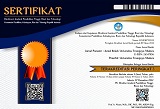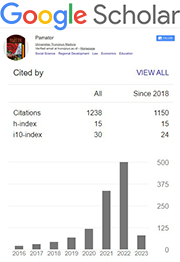Analysis of the Influence of Selection Quality on Competence: Intrinsic Motivation and Integrity as Mediation
Abstract
This study aims to analyze the influence of selection quality on employee competencies with intrinsic motivation and integrity as mediating variables. This research method was carried out at the Yogyakarta Police with a sample of 148 respondents, using a questionnaire prepared on a Likert scale of 1 to 5, to measure how much the causality relationship between selection quality variables, integrity, intrinsic motivation, and competence was analyzed using AMOS SEM. The results of the study show that the quality of selection has a positive and significant effect on the integrity and intrinsic motivation of employees in the DIY Police. Integrity and intrinsic motivation have been shown to play a role as mediators in the relationship between selection quality and competence. Specifically, the quality of good selection increases integrity and intrinsic motivation, which in turn contributes to the improvement of employee competence. However, the quality of selection does not have a direct effect on competence, but through an indirect influence through these mediation variables. These findings confirm the importance of proper selection in improving employee competencies through increased integrity and intrinsic motivation. The conclusion of this study is that the quality of selection has a positive effect on integrity and intrinsic motivation, which in turn improves employee competence. The influence of selection quality on competence occurs indirectly through the mediation of integrity and intrinsic motivation.
Keywords
Full Text:
PDFReferences
Agustin, C. S., Desvi, T., Sari, V., Aisyah, P., Anshori, M. I., Madura, U. T., Jl, A., Telang, R., Kamal, P. O. B., & Madura, B. (2023). Employee Adaptability Skill Development. 1(4).
Andalas, U. (2019). The Impact of Recruitment, Selection, and Motivation on Employee Performance of Pt Bank Xyz Tbk Padang Essy Pratisardy Branch, Hendra Lukito *) *). 21(1).
Anggriawan, B., Rusdianti, E., & Santoso, D. (2023). The effect of competence, training and compensation on employee performance with affective commitment as an intervening variable. Journal of Economic and Business Research, 16, 48. https://doi.org/10.26623/jreb.v16i1.6397
Charbonnier-Voirin, A., & Roussel, P. (2012). Adaptive Performance: A New Scale to Measure Individual Performance in Organizations. Canadian Journal of Administrative Sciences / Revue Canadienne Des Sciences de l Administration, 29, 280–293. https://doi.org/10.1002/cjas.232
Fahlevi Si, M., & Satrya, A. (2020). The Effect of Mediation of Member Exchange Leaders, Intrinsic Motivation and Psychological Empowerment on the Influence of Ethical Leadership on the Creativity of State Civil Apparatus. Mixed Scientific Journal of Management, 10, 45. https://doi.org/10.22441/mix.2020.v10i1.004
Fajriyani, D., Fauzi, A., Kurniawati, M. D., Yudo, A., & Dewo, P. (2023). Challenges of Human Resource Competencies in Facing the Digital Era (Literature Review). 4(6), 1004–1013.
Flores, E., Xu, X., & Lu, Y. (2020). Human Capital 4.0: a workforce competence typology for Industry 4.0. Journal of Manufacturing Technology Management, 31(4), 687–703. https://doi.org/10.1108/JMTM-08-2019-0309
Halisa, N. N. (2020). The Role of Human Resource Management "Recruitment, Selection, Competency and Training Systems" on Competitive Advantage: Literature Review. ADI Interdisciplinary Digital Business Journal, 1(2 December), 14–22. https://doi.org/10.34306/abdi.v1i2.168
Hamid, M., & Rukaiyah, S. (2024). The Influence of Competence, Organizational Commitment and Motivation on the Performance of Employees of the National Unity and Political Agency of North Penajam Paser Regency. ELPEI Online Journal of Management, 4(2), 1094–1103.
Inaya, S. A., Mukminah, P., Jannah, I., Rahayu, W. S., & Madura, U. T. (2024). Optimizing Company Performance Through Accurate Employee Testing and Selection. Sec. 3.
K, J., & Ranjit, G. (2022). Explicating intrinsic motivation’s impact on job performance: employee creativity as a mediator. Journal of Strategy and Management, 15(4), 647–664. https://doi.org/10.1108/JSMA-04-2021-0091
Krug, M., Elliott, M., Gordon, A., Hogeveen, J., & Solomon, M. (2020). Proactive Control in Adolescents and Young Adults With Autism Spectrum Disorder: Unimpaired but Associated With Symptoms of Depression. Journal of Abnormal Psychology, 129. https://doi.org/10.1037/abn0000527
Li, C., Niu, Y., Xin, Y., & Hou, X. (2024). Emergency department nurses’ intrinsic motivation: A bridge between empowering leadership and thriving at work. International Emergency Nursing, 77, 101526. https://doi.org/https://doi.org/10.1016/j.ienj.2024.101526
Morandini, S., Fraboni, F., De Angelis, M., Puzzo, G., Giusino, D., & Pietrantoni, L. (2023). The Impact of Artificial Intelligence on Workers’ Skills: Upskilling and Reskilling in Organisations. Informing Science: The International Journal of an Emerging Transdiscipline, 26, 039–068. https://doi.org/10.28945/5078
Muslim, M., Nurwanah, A., Sari, R., & Arsyad, M. (2020). The influence of work experience, independence, integrity, competence and ethics of audit quality auditors. Discourse Equiliberium (Journal of Economic Research Thought), 8(2), 100–112. https://doi.org/10.31102/equilibrium.8.2.100-112
Ramadhan, M. A., Lannai, D., Ramdani, M. R., & Abduh, M. (2022). The Influence of Auditor Independence and Integrity on Audit Quality with Risk-Based Audits as a Moderation Variable at Makassar City Public Accounting Firms. Paradox: Journal of Economics, 5(1), 40–54. https://doi.org/10.57178/paradoks.v5i1.284
Ruauw, M., Trang, I., & Lumintang, G. G. (1869). Pengaruh Gaya Kepemimpinan, Upah Dan Teknologi Informasi Terhadap Kualitas Kerja Tenaga Harian Lepas Pada Dinas Komunikasi Dan Informatika Kota Manado the Effect of Leadership Style, Wage and Information Technology on the Quality of Daily Freedom Work At the Communication and Informatics Department of Manado City. EMBA Journal, 10(4), 1869–1880.
Schmidt, F., & Hunter, J. E. (1998). The Validity and Utility of Selection Methods in Personnel Psychology: Practical and Theoretical Implications of 85 Years of Research Findings. Psychological Bulletin, 124, 262–274. https://doi.org/10.1037//0033-2909.124.2.262
Septiana, S., Wicaksono, R. N., Saputri, A. W., Fawwazillah, N. A., & Anshori, M. I. (2023). Improving the competence of human resources for the future. Student Research Journal, 1(5), 447–465.
Setiyawan, D., Pharmacy, F., & Pancasila, U. (2018). The influence of selection, training on competencies and their impact on employee performance. 1 (April), 87–94.
Sinta, S. F., Sujianto, A. E., & Nurohman, D. (2023). Determination of Job Satisfaction and Employee Performance: Competencies and Islamic Work Ethic of BMT Employees in Tulungagung. Sanskara Economics and Entrepreneurship, 2(01), 61–73. https://doi.org/10.58812/sek.v2i01.107
Suwarno, & Aprianto, R. (2019). The Effect of Work Experience and Career Development on Employee Performance at Pt Sinar Niaga Sejahtera Lubuklinggau City. Journal of Business Economics, 24(1), 51–68. https://doi.org/10.35760/eb.2019.v24i1.1855
Umiati, S. D., & Hamka, H. (2023). Career Development Strategies to Overcome Turnover Intention (Desire to Move) in Police Personnel (Case Study: Satker Bid Tik Polda Metro Jaya). Journal of Public Policy and Applied Administration, 5(1), 104–116.
Yuliasmi, Putra, A. Nu. J., & Masnon. (2020). The Influence of the Integrity of the State Civil Apparatus (ASN) on the Quality of Public Services at the Kerinci Regency Education Office. Journal of Student Administration, 2(8), 80–90.
Zhang, J., Zhang, Y., Song, Y., & Gong, Z. (2016). The different relations of extrinsic, introjected, identified regulation and intrinsic motivation on employees’ performance. Management Decision, 54(10), 2393–2412. https://doi.org/10.1108/MD-01-2016-0007
DOI: https://doi.org/10.21107/pamator.v18i2.29840
Refbacks
- There are currently no refbacks.
Copyright (c) 2025 wawan tri wibowo

This work is licensed under a Creative Commons Attribution-ShareAlike 4.0 International License.
Jurnal Pamator : Jurnal Ilmiah Universitas Trunojoyo by Universitas Trunojoyo Madura is licensed under a Creative Commons Attribution-ShareAlike 4.0 International License.















.png)